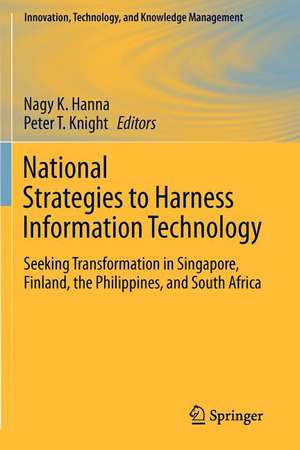National Strategies to Harness Information Technology: Seeking Transformation in Singapore, Finland, the Philippines, and South Africa: Innovation, Technology, and Knowledge Management
Editat de Nagy K. Hanna, Peter T. Knighten Limba Engleză Paperback – 19 noi 2012
In National Strategies to Harness Information Technology, Nagy Hanna and Peter Knight provide a framework for assessing the opportunities, challenges, and prospects for “e-transformation” and for analyzing the options and innovations adopted to manage the e-transformation process. They ask hard questions: what does it take to harness ICT to transform an economy? Why some countries accelerate their development journey with ICT while others fail? How did successful countries balance the need for strategic leadership with bottom up innovation? Can countries reduce the risks of digital divide? What have been the roles of government and private sectors? What lessons can be learned for countries at different levels of development?
Featuring contributions from country experts, the editors and authors provide in-depth case studies of ICT deployment in Singapore, Finland, the Philippines, and South Africa, and asses the progress of such efforts. The result is an essential resource for academic researchers, policy analysts, policymakers, and industry leaders interested in the role of ICT in national development, innovation, and economic growth.
In National Strategies to Harness Information Technology, Nagy Hanna and Peter Knight provide a framework for assessing the opportunities, challenges, and prospects for “e-transformation” and for analyzing the options and innovations adopted to manage the e-transformation process. They ask hard questions: what does it take to harness ICT to transform an economy? Why some countries accelerate their development journey with ICT while others fail? How did successful countries balance the need for strategic leadership with bottom up innovation? Can countries reduce the risks of digital divide? What have been the roles of government and private sectors? What lessons can be learned for countries at different levels of development?
Featuring contributions from country experts, the editors and authors provide in-depth case studies of ICT deployment in Singapore, Finland, the Philippines, and South Africa, and asses the progress of such efforts. The result is an essential resource for academic researchers, policy analysts, policymakers, and industry leaders interested in the role of ICT in national development, innovation, and economic growth.
| Toate formatele și edițiile | Preț | Express |
|---|---|---|
| Paperback (1) | 638.57 lei 6-8 săpt. | |
| Springer – 19 noi 2012 | 638.57 lei 6-8 săpt. | |
| Hardback (1) | 644.82 lei 6-8 săpt. | |
| Springer – 9 dec 2011 | 644.82 lei 6-8 săpt. |
Din seria Innovation, Technology, and Knowledge Management
- 15%
 Preț: 643.99 lei
Preț: 643.99 lei -
 Preț: 281.97 lei
Preț: 281.97 lei - 18%
 Preț: 954.62 lei
Preț: 954.62 lei - 15%
 Preț: 653.14 lei
Preț: 653.14 lei - 18%
 Preț: 945.62 lei
Preț: 945.62 lei - 18%
 Preț: 890.54 lei
Preț: 890.54 lei - 15%
 Preț: 640.06 lei
Preț: 640.06 lei -
 Preț: 383.93 lei
Preț: 383.93 lei - 15%
 Preț: 633.02 lei
Preț: 633.02 lei - 18%
 Preț: 1124.60 lei
Preț: 1124.60 lei - 18%
 Preț: 956.81 lei
Preț: 956.81 lei -
 Preț: 389.49 lei
Preț: 389.49 lei - 15%
 Preț: 655.13 lei
Preț: 655.13 lei - 20%
 Preț: 570.97 lei
Preț: 570.97 lei - 15%
 Preț: 642.03 lei
Preț: 642.03 lei - 18%
 Preț: 941.50 lei
Preț: 941.50 lei - 15%
 Preț: 643.00 lei
Preț: 643.00 lei - 18%
 Preț: 732.52 lei
Preț: 732.52 lei - 15%
 Preț: 637.59 lei
Preț: 637.59 lei - 18%
 Preț: 890.06 lei
Preț: 890.06 lei - 15%
 Preț: 635.47 lei
Preț: 635.47 lei -
 Preț: 391.99 lei
Preț: 391.99 lei -
 Preț: 391.99 lei
Preț: 391.99 lei - 15%
 Preț: 632.22 lei
Preț: 632.22 lei - 20%
 Preț: 584.75 lei
Preț: 584.75 lei - 15%
 Preț: 642.18 lei
Preț: 642.18 lei - 18%
 Preț: 894.16 lei
Preț: 894.16 lei - 18%
 Preț: 943.73 lei
Preț: 943.73 lei - 15%
 Preț: 644.49 lei
Preț: 644.49 lei - 18%
 Preț: 947.85 lei
Preț: 947.85 lei - 15%
 Preț: 656.89 lei
Preț: 656.89 lei - 18%
 Preț: 954.45 lei
Preț: 954.45 lei - 18%
 Preț: 1006.72 lei
Preț: 1006.72 lei - 18%
 Preț: 727.31 lei
Preț: 727.31 lei - 15%
 Preț: 642.51 lei
Preț: 642.51 lei - 18%
 Preț: 953.65 lei
Preț: 953.65 lei - 15%
 Preț: 639.59 lei
Preț: 639.59 lei - 15%
 Preț: 645.47 lei
Preț: 645.47 lei - 18%
 Preț: 952.26 lei
Preț: 952.26 lei - 15%
 Preț: 639.08 lei
Preț: 639.08 lei
Preț: 638.57 lei
Preț vechi: 751.25 lei
-15% Nou
Puncte Express: 958
Preț estimativ în valută:
122.21€ • 127.11$ • 100.89£
122.21€ • 127.11$ • 100.89£
Carte tipărită la comandă
Livrare economică 14-28 aprilie
Preluare comenzi: 021 569.72.76
Specificații
ISBN-13: 9781461462224
ISBN-10: 1461462223
Pagini: 256
Ilustrații: XIV, 242 p.
Dimensiuni: 155 x 235 x 13 mm
Greutate: 0.37 kg
Ediția:2012
Editura: Springer
Colecția Springer
Seria Innovation, Technology, and Knowledge Management
Locul publicării:New York, NY, United States
ISBN-10: 1461462223
Pagini: 256
Ilustrații: XIV, 242 p.
Dimensiuni: 155 x 235 x 13 mm
Greutate: 0.37 kg
Ediția:2012
Editura: Springer
Colecția Springer
Seria Innovation, Technology, and Knowledge Management
Locul publicării:New York, NY, United States
Public țintă
ResearchCuprins
Why National e-Transformation Strategies?.- The e-Transformation Journey of Singapore.- Information Society and Consensus Formation in Finland.- A Decade of e-Development in South Africa: Sufficient for a “Services (R)evolution”?.- The Philippines: The Quest for Genuine e-Development.- Comparative Experience and Lessons in e-Transformation.- Index.
Recenzii
From the reviews:
“This work examines the highly individual paths of development of information and communication technologies (ICT) in Singapore, Finland, South Africa, and the Philippines during the last two decades. The result is a valuable resource for all stakeholders … ranging from academic researchers and policy analysts to policy makers, such as local politicians or transnational agencies, and industry leaders and lobbyists. … this work enriches the research, learning, and development communities striving to help countries on their individual e-transformation journeys.” (Christoph F. Strnadl, ACM Computing Reviews, July, 2012)
“This work examines the highly individual paths of development of information and communication technologies (ICT) in Singapore, Finland, South Africa, and the Philippines during the last two decades. The result is a valuable resource for all stakeholders … ranging from academic researchers and policy analysts to policy makers, such as local politicians or transnational agencies, and industry leaders and lobbyists. … this work enriches the research, learning, and development communities striving to help countries on their individual e-transformation journeys.” (Christoph F. Strnadl, ACM Computing Reviews, July, 2012)
Notă biografică
Nagy K. Hanna is an author, international development strategist, and thought leader, with over 30 years of experience in advising countries and aid agencies on designing and implementing programs to leverage information and communication technology (ICT) in support of competitiveness, private sector development, and public sector reform. He has worked with stakeholders cutting across public, private and civil society leadership. From 1975 to 2005 he served in a variety of positions at the World Bank, most recently as senior advisor on e-strategies, where he established a global community of practice on e-development and chaired a seminar series to develop e-government and e-leadership. Currently, he advises countries on developing policies, institutions, and leadership capabilities for coordinating ICT for development programs, and has served as a Visiting Professor at Duke University and Senior Fellow at the University of Maryland. He has lectured and published extensively on e-development, strategic planning, change management, executive education, and institutional development. He holds a Ph.D. in Socio-Economic Planning from the Wharton School, University of Pennsylvania, and Masters degrees in Operations Research and Industrial Engineering.
Peter T. Knight is an economist, training strategist, and information age change agent with broad international experience in distance education, training strategy/evaluation, e-government, electronic media, telecomunications reform, international banking, foundation work, teaching, and research. He has worked extensively in Africa (especially South Africa), Latin America (especially Brazil), and Eastern Europe and Asia (especially Russia). He is a partner in Knight, Moore and President of Telemática e Desenvolvimento Ltda, advising such clients as the World Bank, Inter-American Development Bank, SRI International/National Science Foundation, US Department of State, United NationsDevelopment Programme, Pakistan, and Rio de Janeiro State Research Foundation (FAPERJ). From 1976 to 1997 he served in a variety of positions at the World Bank. He holds a Ph.D. in Economics from Stanford University.
Peter T. Knight is an economist, training strategist, and information age change agent with broad international experience in distance education, training strategy/evaluation, e-government, electronic media, telecomunications reform, international banking, foundation work, teaching, and research. He has worked extensively in Africa (especially South Africa), Latin America (especially Brazil), and Eastern Europe and Asia (especially Russia). He is a partner in Knight, Moore and President of Telemática e Desenvolvimento Ltda, advising such clients as the World Bank, Inter-American Development Bank, SRI International/National Science Foundation, US Department of State, United NationsDevelopment Programme, Pakistan, and Rio de Janeiro State Research Foundation (FAPERJ). From 1976 to 1997 he served in a variety of positions at the World Bank. He holds a Ph.D. in Economics from Stanford University.
Textul de pe ultima copertă
The ability to harness Information Communication Technologies (ICTs) is increasingly at the heart of competitiveness and sustainable growth. As countries engage in an increasingly competitive global economy, they are trying to weave ICT into their development strategies, in the same way enterprises have learned to use ICT to transform their business models and strategies. This integration offers a new path to development that is responsive to the challenges of our times.
In National Strategies to Harness Information Technology, Nagy Hanna and Peter Knight provide a framework for assessing the opportunities, challenges, and prospects for “e-transformation” and for analyzing the options and innovations adopted to manage the e-transformation process. They ask hard questions: what does it take to harness ICT to transform an economy? Why some countries accelerate their development journey with ICT while others fail? How did successful countries balance the need for strategic leadership with bottom up innovation? Can countries reduce the risks of digital divide? What have been the roles of government and private sectors? What lessons can be learned for countries at different levels of development?
Featuring contributions from country experts, the editors and authors provide in-depth case studies of ICT deployment in Singapore, Finland, the Philippines, and South Africa, and asses the progress of such efforts. The result is an essential resource for academic researchers, policy analysts, policymakers, and industry leaders interested in the role of ICT in national development, innovation, and economic growth.
In National Strategies to Harness Information Technology, Nagy Hanna and Peter Knight provide a framework for assessing the opportunities, challenges, and prospects for “e-transformation” and for analyzing the options and innovations adopted to manage the e-transformation process. They ask hard questions:what does it take to harness ICT to transform an economy? Why some countries accelerate their development journey with ICT while others fail? How did successful countries balance the need for strategic leadership with bottom up innovation? Can countries reduce the risks of digital divide? What have been the roles of government and private sectors? What lessons can be learned for countries at different levels of development?
Featuring contributions from country experts, the editors and authors provide in-depth case studies of ICT deployment in Singapore, Finland, the Philippines, and South Africa, and asses the progress of such efforts. The result is an essential resource for academic researchers, policy analysts, policymakers, and industry leaders interested in the role of ICT in national development, innovation, and economic growth.
In National Strategies to Harness Information Technology, Nagy Hanna and Peter Knight provide a framework for assessing the opportunities, challenges, and prospects for “e-transformation” and for analyzing the options and innovations adopted to manage the e-transformation process. They ask hard questions: what does it take to harness ICT to transform an economy? Why some countries accelerate their development journey with ICT while others fail? How did successful countries balance the need for strategic leadership with bottom up innovation? Can countries reduce the risks of digital divide? What have been the roles of government and private sectors? What lessons can be learned for countries at different levels of development?
Featuring contributions from country experts, the editors and authors provide in-depth case studies of ICT deployment in Singapore, Finland, the Philippines, and South Africa, and asses the progress of such efforts. The result is an essential resource for academic researchers, policy analysts, policymakers, and industry leaders interested in the role of ICT in national development, innovation, and economic growth.
In National Strategies to Harness Information Technology, Nagy Hanna and Peter Knight provide a framework for assessing the opportunities, challenges, and prospects for “e-transformation” and for analyzing the options and innovations adopted to manage the e-transformation process. They ask hard questions:what does it take to harness ICT to transform an economy? Why some countries accelerate their development journey with ICT while others fail? How did successful countries balance the need for strategic leadership with bottom up innovation? Can countries reduce the risks of digital divide? What have been the roles of government and private sectors? What lessons can be learned for countries at different levels of development?
Featuring contributions from country experts, the editors and authors provide in-depth case studies of ICT deployment in Singapore, Finland, the Philippines, and South Africa, and asses the progress of such efforts. The result is an essential resource for academic researchers, policy analysts, policymakers, and industry leaders interested in the role of ICT in national development, innovation, and economic growth.
Caracteristici
Integrates analytical insights, practical application, and policymaking across the fields of development economics, public administration, and information and communication technology to show how ICT can impact development International coverage, featuring in-depth case studies from country specialists Also for business decision makers in the ICT industry, consulting firms, and investors, and public decision makers in government agencies and ministries, NGOs, and aid organizations, in addition to researchers and students Includes supplementary material: sn.pub/extras













